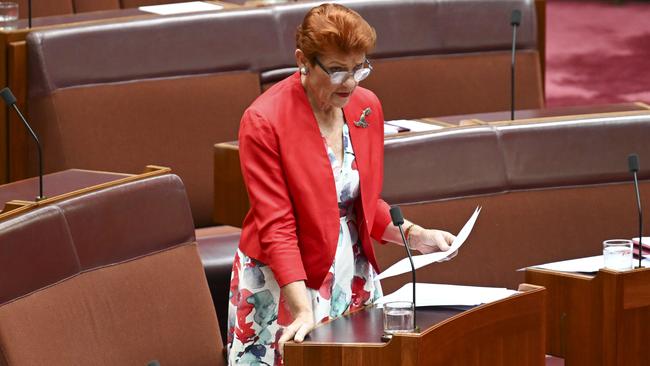
And a more pertinent question is whether the “prohibition of certain types of speech in 18C of the Racial Discrimination Act to offend, insult or humiliate certain people” is necessary and correct or a useless and even insidious attempt to legislate moral behaviour.
First, was the ruling right? In terms of the law, of course the tweet was sent because of the ethnic origins of Greens senator Mehreen Faruqi. You don’t demand publicly in a tweet, “why don’t you pack your bags and piss off back to Pakistan” without making insulting reference to that person’s ethnicity. Hanson also strongly implied that Faruqi was ungrateful for all Australia had done for her.
Faruqi, for her part, naturally felt vindicated by the ruling, saying the decision “draws a line that hate speech is not free speech, and those who subject people to racial abuse will not get away scot-free”. Ironically casting herself as a modern-day Marianne, she claimed “today’s judgment is historic … it is groundbreaking and it will set a new precedent with how racism is viewed in this country”.

That may be going a bit far if Hanson does manage to lodge and win an appeal.
So, what is the real point about this case? Is the elevation of a trivial spat into something that betrays an obsession with race and ethnicity healthy for any society? Is it a clampdown on free speech, as some have claimed, or a victory for modern liberal thinking about race and ethnicity, which most fair-minded people would agree is a hallmark of a civilised society?
It has elements of all of these, but the truth is that this case brought by Faruqi against Hanson was a dangerous example of using the law as a cudgel to silence and intimidate a person whose views on race and ethnicity may not be morally right or particularly nuanced but whose real crime is her history of blustering jingoism, which is simply anathema to the New Thinking illiberal left. Hanson’s history of seeming xenophobia was brought up in the case as evidence against her. So rather than being a victory for liberal thinking, the use of 18C to condemn Hanson as “racist” amounts to illiberal intimidation, an essential element of modern wokeism.
Many thought the Hanson-Faruqi ruling was ridiculous over an insult that was schoolyard stuff, blown out of all proportion.
But here is the problem. The Jewish community now wants more to be done to help and protect it from blind prejudice that stems largely from the strong identification most Jews naturally feel for Israel. In its worst manifestation anti-Semitism has caused recent alarming incidents in Sydney and Melbourne. But how do we clamp down on that in this country without using 18C? Or do we use 18C only for some people and not others?
Now it is becoming apparent all over the world, in the wake of the Middle East war, that various groups are using hate crime laws to silence and intimidate.

Recently in Britain a similar outrage occurred when The Telegraph columnist Allison Pearson was accused of inciting racial hatred. The police came to her door because in a tweet she had criticised police for being more friendly towards “Jew-hating” protesters than towards the Jews.
So, what is the solution to this? How do we tackle this if we abolish 18C? First, I think we have to realise that we cannot legislate away immorality and plain nastiness, otherwise we should legislate for being a nice person.
The problem with 18C is that we have made something that is morally repugnant, but not always harmful, into a crime. True racism can be very damaging, particularly for the young. The psychological effects of bullying and ostracism because of who you are, your name, your ethnicity and family background are lifelong, something I am too well aware of, having suffered this at my up-market school. But kids don’t bring lawsuits against other kids for being cruel and they eventually grow up.
Now the ostracised and despised are being ostracised for their political opinions and cultural outlook, even for what they do or don’t wear. We risk condemning more people than politicians for sometimes minor moral infractions of what is socially acceptable.
Violence is morally repugnant and a crime, but 18C and all the provisions about insult and even hatred, unless it advocates violence, should, in any sane society, be abolished.
However, extreme left wokery has led us down a path that has made it almost impossible to abolish 18C. We can even be condemned for being loudmouthed forceful people, perhaps a not very nice person. Hanson was found guilty for being a loudmouthed politician (among many loudmouthed politicians) whose views did not conform to the racial niceness criterion – some would think her views immoral, but Voltaire was right. You may not agree with Hanson but we should defend her right to say it, tweet or even ignore it even if we don’t think her utterances a particularly flattering example of civilised behaviour.
Mind you, the recent argy-bargy in the Senate with three female senators, one of whom was the redoubtable Lidia Thorpe, didn’t look too civilised or flattering. But apparently that sort of unparliamentary behaviour is OK – as long as you don’t tell anyone to go back to where they came from.





The recent ruling against Pauline Hanson by the Federal Court for an impulsive tweet deemed unlawful because it was insulting “at least in part because of the race, colour or national or ethnic origin of the relevant person or group of people” and was not exempt as fair political comment has outraged many right-wing commentators by what they see as an assault on freedom of speech. Or at least it was a trivial matter blown up into a Federal Court case. But was it right?